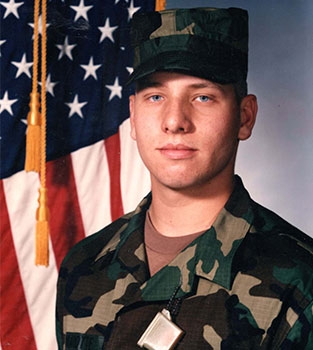
"I'm glad I chose Rhode Island College to complete my degree," says Marotte. "The professors are unbelievable and the students are great."
John Marotte served as a military police officer in the Rhode Island Army National Guard for eight years. But his greatest challenges have been out of uniform.
In January 2018, at age 42, he was diagnosed with thyroid cancer. In fact, 48 tumors were found on his neck, shoulder and collarbone area, 28 of them cancerous, and this was the day after he started his first year at Rhode Island College.
Though his cancer is now in remission, he's been left with cognitive disabilities from the radiation treatment and relies on technology such as apps to help him with recall. His dream is to merge his love of technology with his love of law enforcement.
"I've wanted to be a police officer my whole life," he says. "But I dropped out of high school at the age of 15. I met my future wife when we were both 17. I'd been going down a bad path before I met her. My parents divorced when I was three and both struggled with addiction. It was a less than stellar childhood."
"But my wife came from an amazing Portuguese family," Marotte says. "Her parents didn't speak a word of English when they came to this country, they worked in factories and they raised eight children, all of whom are successful. It opened my eyes to family and what it can be."
Inspired by his brother-in-law, a military police officer (MP), Marotte signed an eight-year contract with the Rhode Island Army National Guard military police.

"I was 18 years old," he recalls, "and I was finally entering the field I loved most – law enforcement. My wife and my mom dropped me off at the Cranston Armory to head off to basic training."
MPs are assigned to military bases for training one weekend out of a month and two weeks a year. His full-time job was at Homecare New England, filling orders for medical equipment and supplies. His military tours were mostly at a base in El Paso, Texas.
When Marotte's eight-year contract ended, he had a one-year-old daughter and wife to support and decided not to renew his contract. The timing turned out to be fateful.
Six months later, after his unit was deployed to Iraq, his platoon sergeant was killed by an IED (an improvised explosive device) that struck his vehicle while on patrol.
"I felt a tremendous amount of guilt," Marotte says. "My platoon sergeant was only 40 years old, with three kids. He had just gotten on the New Bedford police force. He would talk to me about becoming a police officer because that was my dream, too. I told him how proud I was that he had made it. He was one of the best people I know. I felt like I should have been there – with my unit and with my platoon sergeant. I'm here now, and he's not."
Almost as a tribute to his sergeant, Marotte is intent on making sure his life makes a difference. With only a GED, he's been a self-starter and a self-learner. Beginning at age 19, he moved up at Homecare New England from taking orders to delivery, to lead, to supervisor and finally to IT manager. In the evenings, he would borrow a friend's textbook who was attending New England Tech and teach himself computer science.
But when Homecare New England was suddenly bought out, Marotte was out of a job. Without a degree, he couldn't get his foot in the door of an IT company. Finally, with the help of a military buddy, he found an entry-level position at IGT, which produces slot machines and other gambling technology.
"I started out as a tech on the floor of a casino," Marotte says. "I was the guy in the smoky room in the red shirt, replacing the paper in the slot machine and helping people when their machine got jammed or froze up."
Not one to stay at entry-level long, Marotte was promoted twice in eight months and is now an operations manager. "But I'm limited now in the positions I can apply for until I get a degree," he says.
At RIC he is majoring in computer information systems and minoring in data science. He hopes to land a position in law enforcement performing database queries for seizures and investigations.
"I'm glad I chose Rhode Island College to complete my degree," he says. "The professors are unbelievable and the students are great. I thought it would be difficult being the old guy in class, but they accepted me right away and valued my advice. When they asked us to pair up for the semester, I thought no one would want to partner with the old guy. Then I turned around and five other students were following after me."
Despite the cancer and lingering cognitive disabilities, Marotte says it's hard to be negative when you're surrounded by so much support.
"When I started at RIC, one of my first classes involved a group project. Our topic was happiness," he says. "In my portion of the presentation, I told the class, 'The bar for happiness is what you make of it,' and I shared my experience with cancer."
"Then I ended my presentation with a clip from the movie 'The Pursuit of Happyness.' It's that moment in the film when all of Will Smith's hard work pays off and he's offered a position in the company. The clip shows him walking out of the building and onto the street with thousands of people moving in slow motion around him, and he says, 'This part of my life, this little part, is called happiness.'"
